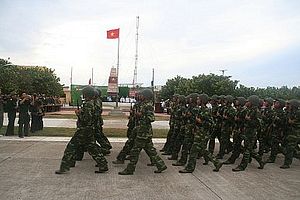On Monday, Vietnam officially announced what the government characterized as a designated cyberspace operations command. The development was just the latest in a series of moves we have seen from the Southeast Asian state as it seeks to boost its capabilities to respond to growing challenges in the cyber realm.
Vietnamese officials have repeatedly stressed that a confluence of several trends, including the increasing number of Vietnamese going online and the emphasis on the fourth industrial revolution, presents opportunities but also major challenges for Hanoi, especially in the cyber realm where opponents can use various means to sabotage the regime. Not unlike some of its other Asian neighbors, the Vietnamese government has come to recognize that cyber is a critical fifth combat area for the country to master, following land, water, air, and space.
As a result, Vietnam’s cyber challenge has been elevated to a top priority and the government has been mulling several measures across the board over the past few years, including new legislation, boosting collaboration with other countries to help develop its own capabilities, exerting greater control and regulation of social media networks, and developing its own cyber defenses (See: “New ASEAN Cyber Drill Kicks Off in Vietnam“).
Though this has been going on for a while now, we have seen greater attention to this over the past few weeks. Much of this recent wave of international media attention has come following remarks by Nguyen Trong Nghia, the deputy chairman of the General Political Department of the Vietnam People’s Army (VPA) about the existence of Task Force 47, a cyber unit that was already in operation consisting of around 10,000 personnel.
On Monday, Vietnam officially announced the creation of the “Cyberspace Operations Command.” The announcement came at a ceremony in Hanoi that was attended by top officials, including Prime Minister Nguyen Xuan Phuc and Defense Minister Ngo Xuan Lich, and Deputy Defense Minister Phan Van Giang.
According to the defense ministry, the Cyperspace Operations Command, which would be directly under the Ministry of National Defense (MND), would be the institution responsible for helping implement state-led efforts to protect national sovereignty in cyberspace as well as manage information technology security within the Vietnamese People’s Army (VPA). In his remarks at the ceremony, Phuc framed the decision in the context of the country’s broader challenge, noting both the reality that cyberspace was critical not only for defense, but other areas like foreign affairs and economic development, as well as the need to study new cyber tactics and to invest in better personnel.
Few other details were publicly announced. But as the new Command develops, it will be interesting to see how it fits within the broader priorities in the cyber realm that officials have highlighted as well as how it works with other bodies in the country, such as the Ministry of Information and Communications and the Ministry of Public Security, which also have roles in the cyber domain as well.
































